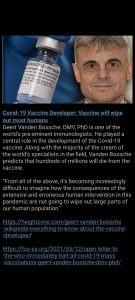IN THE UNITED STATES DISTRICT Court
AMERICA’S FRONTLINE DOCTORS
PETITION FOR TEMPORARY RESTRAINING ORDER
vs.
XAVIER BECERRA, Secretary of the U.S. Department of Health and Human Services, and U.S. DEPARTMENT OF HEALTH AND HUMAN SERVICES, AND John & Jane Does I-V; Black & White Partnerships; and ABC Corporations I-V,
Defendants.
Dear Friend,
Today America’s Frontline Doctors filed a petition for a temporary restraining order against the U.S. Secretary of the U.S. Department of HHS, Xavier Becerra.
Here’s why:
Children are not guinea pigs: There is a statistically zero percent chance of young people dying of COVID-19. To promote an investigational product that has no long-term studies and no animal studies, to pressure parents and teens to use an experimental product that has not been fully approved by the FDA breaks all of the rules of medicine and the HHS’ own goal to protect Americans.
The expansion of the Emergency Use Authorization (EAU) for younger children is all risk and no benefit. HHS is ignoring the science and the data.
HHS is betraying its mission to, “enhance the health and well-being of all Americans…and by fostering sound, sustained advances in the sciences underlying medicine, public health, and social services.”
Sadly, millions of parents are being misled by HHS Secretary Becerra and the FDA, and we are calling on the Federal Courts to stop Becerra and compel HHS to suspend the promotion and rush to administer a vaccine that has not been fully tested and approved.
COVID 19 Vaccine Side Effects: We’ve never seen this level of side effects for any vaccine without the FDA taking action. The Rotavirus vaccine was canceled for 15 cases of non-lethal side effects and the Swine Flu vaccine was canceled for 25 deaths. But now, by the CDC’s own data, we are seeing a 12,000 percent increase in deaths with these vaccines and they’re still promoting this to our kids.
Support the Science: Under the age of 20, the survivability rate for COVID-19 is 99.997 percent. More than 4,000 deaths have been tied to the administering of COVID-19 vaccines in the last four months as opposed to 1,500 total in the previous ten years for all vaccines.
This last fact alone should be enough to STOP this dangerous vaccine. But HHS, the FDA and the CDC are ignoring the science and they are putting the lives of our children on the line. Thousands of doctors and physician groups across the world are demanding the vaccine rollout be stopped. But America’s Frontline Doctors is the one group that is suing to make sure that the government does not continue down this dangerous road.
Please consider assisting America’s Frontline Doctor’s today with your gifts of support. Your donation of $25, $50, $500, or more will support our critical efforts to hold our elected officials accountable, inform parents, and protect children from harm.
Thank you for standing with us again today.
For Liberty,









